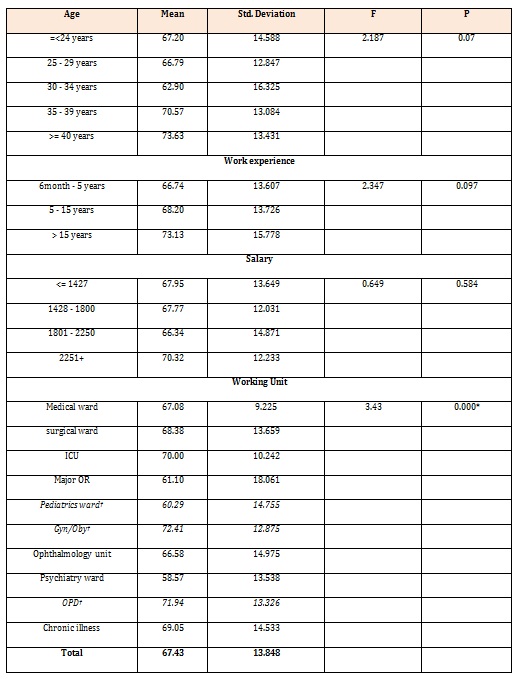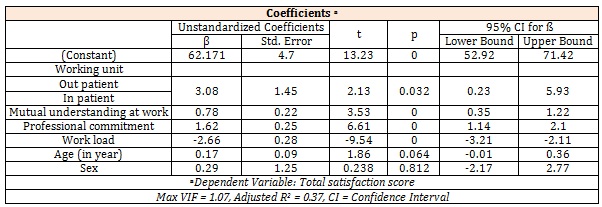
Citation: Ayele S . Nurses Job Satisfaction in Public Hospitals of South West Region of Ethiopia, 2014. Ergonomics Int J 2017, 1(3): 000113.
*Corresponding author: Ayele Semachew, School of Nursing, College of Medicine and Health Sciences, Bahir Dar University, Bahir Dar Ethiopia, Tel: +251913959205; Email: ayeles@bdu.edu.et
There are no adequate research findings that address the issues of job satisfaction in developing countries including Ethiopia. We there for aimed to evaluate the level of job satisfaction and factors influencing it on nurses on South West Ethiopian public hospitals, southwestern Ethiopia.
Institutional based census was employed from March to April, 2014 to conduct the study. Data were collected using closed ended questionnaire by using a modified version of the McCloskey/Mueller Satisfaction Scale. Bivariate and multivariable linear regressions were conducted to assess strength of association.
Generally the mean job satisfaction score of nurses working in the South West Region Ethiopia was (67.43 ± 13.85). A third (33.5%) of them had low level job satisfaction. Some factors were identified to influence nurse’s job satisfaction in their job.
Thirty three point five percent of the study participants had low level towards their job satisfaction. The dependent variable was predicted by professional commitment, workload, working unit, and mutual understanding at work predicted the outcome variable.
Keywords: Job satisfaction; Nursing; Public hospital; Ethiopia
When one is satisfied in his/her job then this will have positive impact on the outcome health and health related issues on clients [1]. Many of public health facilities need large amount of human resource [2], from these large amount of human resources needed nurses constitutes the largest proportion [3]. Now a days the main concern of each public health facilities is to provide quality care for their clients. But the main issues here on how to achieve and improve this quality patient care and improved patient outcome [4].
Nursing work force in every corner of the world, in each health institutions and in any health care settings play a pivotal role to bring quality patient outcome and this all will be influenced by their job satisfaction at work [5]. These groups of professionals are basic human resource in the achievement of major core plans related to health in country level. Such broad plans like Millennium Development Goals (MDGs) and the then Sustainable Development Goals focusing on health related indicators will not come in operation if these human resources are not well treated in their work place. In their daily task Nurses faces different clients in relation to patient’s problem, socio-economic conditions and other related matters [6-8].
Research findings showed that job satisfaction of employees in general, more specifically in nursing staff is on the decline worldwide [9]. In many hospital setups more nurses seem to be more dissatisfied from their work which in turn affects the outcome of service users. As stated in many literatures around the globe as nurses become least satisfied this affect the quality of health service [10,11].
Many literatures agreed that as there are many unidentified factors that may influence nurses job satisfaction and this may affect their role [12]. Like that of many countries including Ethiopia communities’ perception towards nursing profession is low. In addition to this the countries policy towards the nursing profession is not as such encouraging in terms of continuous professional development, salary and work schedule. Due to these and other unspecified reasons many nurses are trying to join non-nursing field of studies and this may in turn may affect the quality of patient outcome [13,14]. The aim of this commentary is to highlight the main issues that encompasses based on the study done on the level of nurses’ job satisfaction and factors associated with it among nurses working in South West Ethiopian public hospitals.
Background CharacteristicsA total of 316 nurses were involved in the census. Eighty five point eight percent were from Jimma University Specialized Hospital. The rest nurses were included from Shenen Gibe and Limugenete hospitals. The average age of study participants’ was 27.87 years. Forty nine point four percent of participants were male. Regarding to their educational status 62.3% of the respondents had diploma in nursing. When we come to working unit/department, 20.9 and 20.3% were involved from the surgical ward and outpatient department (OPD) respectively.
Level of Job SatisfactionThirty three point five percent of nurses had low level of job satisfaction. Satisfaction from coworkers was the highest level of job satisfaction, while nurses had the lowest satisfaction from professional opportunities.
Almost 60% of nurses were very dissatisfied with their monthly salary. Very few numbers of nurses were very satisfied for the compensation give for weekend and holydays. Relationship with one’s coworkers and nursing peers was an item in which nurses were most satisfied.
Some Reasons of SatisfactionHelping clients were mentioned as the major source of pleasure and satisfaction as stated by 68.4% of nurses. Surprisingly, almost 9% of nurses stated as professional pleasure as their source of satisfaction.
Some Reasons of DissatisfactionWorkload was the major source of dissatisfaction as mentioned by 28.9% of nurses and performance evaluation also another source of dissatisfaction. Poor attitude towards nursing by other personals, supply shortage (water, medical equipment), salary & duty is not provided on time, poor work recognition from superiors and also supervisors do not know well what to be supervised, and some participating nurses stated being a nurse by itself is a source of dissatisfaction.
Mean Difference on Selected Background VariablesIn order to know whether there was mean difference in the nurse’s overall job satisfaction in relation to their age, work experience, salary & working unit one way between group analysis of variance was done. The analysis does not show significance difference for the overall mean score of job satisfaction across the first three variables; F (4,311) = 2.18, P = 0.07; F (2,313) = 2.34, P=0.09 and F (3, 312) = 0.649, p = 0.584 respectively. Whereas there was a statistically significant difference between the groups of working units: F (9,306) = 3.43, p = 0.000. Post-hoc comparisons using the Tukey HSD test indicated that the mean score for Gyn/obs (maternity) (72.4±12.9) was significantly different from OPD (71.9±13.3) and from Pediatrics ward (60.29±14.7) (Table 1).
Factors Associated with Job SatisfactionIn order to differentiate whether the outcome variable is influenced by different predictor variables the researcher conducted bivariate and multiple logistic regression analysis. Based on this all candidate predictor variables from bivariate regression were entered into multiple linear regression models. From all predictor variables a total of 13 variables were significant in the bivariate model but only working unit, mutual understanding at work, professional commitment, and workload were found to be the final predictor of job satisfaction. When the variance explained by all other variables in the model is controlled, working unit, mutual understanding at work and professional commitment showed significant and positive relationship with the overall job satisfaction. However, workload showed a significant but negative relationship with the overall job satisfaction score. The rest of the variables were not significantly associated with job satisfaction. A unit increase in professional commitment score would result in the overall job satisfaction score increasing by 1.62 units. A unit increase in the mutual understanding score would result in the overall job satisfaction score increasing by 0.78 units. A unit increase in the workload score would result in the overall job satisfaction score dropping by −2.66 units. And those nurses who were working in the outpatient department (OPD) were 3.08 times more likely to be satisfied than those working in the inpatient unit (Table 2).
ConclusionOne third of the study participants had a low level of job satisfaction. Level of job satisfaction was positively associated with mutual understanding at work and professional commitment, whereas it was found to be negatively associated with working at the inpatient unit and increased workload.
Fostering and maintaining a higher level of job satisfaction among nurses is vital to limit turnover and ensure the delivery of quality care.

*Significant at 0.01; †indicates that there is a difference between these groups
Table 1: One-way ANOVA; overall job satisfaction of nurses in selected variable sat Jimma zone public hospitals, south west Ethiopia, 2014.

Table 2: Multivariable linear regression predicting Job satisfaction among nurses working in Jimma zone public hospitals, south west Ethiopia, 2014.
Chat with us on WhatsApp